- Home
- Juliet Marillier
Child of the Prophecy Page 3
Child of the Prophecy Read online
Page 3
He stood poised there a moment as his audience hushed and froze, feeling no doubt some of the same fascinated terror that gripped me. Far, far below the waves crashed and sucked, and far above the gulls screamed a warning. Darragh did not raise his arms for a dive. He simply leaned forward and plummeted down headfirst, straight as an arrow, hands by his sides, down and down until his body entered the water as neatly as a gannet diving for fish; and I watched one great wave wash over the spot where he had vanished, and another, and a third, while my heart hammered with fear, and then, much farther in toward the shore, a sleek dark head emerged from the water and he began to swim, and a cheer went up from the boys on the ledge and the girls on the sand, and when he came out of the water, dripping, laughing, she was there to greet him and to offer him the shawl from her own shoulders to dry himself off with.
I did not concentrate very well that day, and Father gave me a sharp look, but said nothing. It was my own choice not to go back and watch them after that. What Father had taught me was right. A sorcerer, or a sorcerer’s daughter, could not perform the tasks required, could not practice the art to the full, if other things were allowed to get in the way.
It was close to Lugnasad and that summer’s end when my father told me his own story at last. We sat before the fire after a long day’s work, drinking our ale. At such times we were mostly silent, absorbed with our own thoughts. I was watching Father as he stared into the flames, and I was thinking how he was losing weight, the bones of his face showing stark beneath the skin. He was even paler than usual. Teaching me must be a trial to him sometimes. No wonder he looked weary. I would have to try harder.
“You know we are descended from a line of sorcerers, Fainne,” he said suddenly, as if simply following a train of thought.
“Yes, Father.”
“And you understand what that means?”
I was puzzled that he should ask me this. “That we are not the same as ordinary folk, and never can be. We are set apart, neither one thing nor the other. We can exercise the craft, for what purpose we may choose. But some elements of magic are beyond us. We may touch the Otherworld, but are not truly of it. We live in this world, but we never really belong to it.”
“Good, Fainne. You understand, in theory, very well. But it is not the same to go out into the world and discover what this means. You cannot know what pain this half-existence can bring. Tell me, do you remember your grandmother? It is a long time since she came here; ten years and more. Perhaps you have forgotten her.”
I frowned in concentration. “I think I can remember. She had eyes like ours, and she stared at me until my head hurt. She asked me what I’d learned, and when I told her, she laughed. I wanted her to go away.”
Father nodded grimly. “My mother does not choose to go abroad in the world. Not now. She keeps to the darker places; but we cannot dismiss her, nor her arts. We bear her legacy within us, you and I, whether we will or no, and it is through her that we are both less and more than ordinary folk. I had no wish to tell you more of this, but the time has come when I must. Will you listen to my story?”
“Yes, Father,” I whispered, shocked.
“Very well. Know, then, that for eighteen years of my existence I grew up in the nemetons, under the protection and nurture of the wise ones. What came before that I cannot remember, for I dwelt deep in the great forest of Sevenwaters from little more than an infant. Oak and ash were my companions; I slept on wattles of rowan, the better to hear the voice of the spirit, and I wore the plain robe of the initiate. It was a childhood of discipline and order; frugal in the provision for bodily needs, but full of rich food for the mind and spirit, devoid of the baser elements of man’s existence, surrounded by the beauty of tree and stream, lake and mossy stone. I grew to love learning, Fainne. This love I have tried to impart to you, over the years of your own childhood.
“The greater part of my training in the druid way I owed to a man called Conor, who became leader of the wise ones during my time there. He took a particular interest in my education. Conor was a hard taskmaster. He would never give a straight response to a question. Always, he would set me in the right direction, but leave me to work out the answers for myself. I learned quickly, and was eager for more. I progressed; I grew older, and was a young man. Conor did not give praise easily. But he was pleased with me, and just before I had completed my training, and might at last call myself a druid, he allowed me to accompany him to the great house of Sevenwaters to assist in the ritual of Imbolc.
“It was the first time I had been outside the nemetons and the depths of the forest. It was the first time I had seen folk other than my brethren of the wise ones. Conor performed the ritual and lit the sacred fire, and I bore the torch for him. It was the culmination of the long years of training. After supper he allowed me to tell a tale to the assembled company. And he was proud of me: I could see it on his face, clever as he was at concealing his thoughts. There was a gladness in my heart that night, as if the hand of the goddess herself had touched my spirit and set my feet on a path I might follow joyfully for the rest of my days. From then on, I thought, I would be dedicated to the way of light.
“Sevenwaters is a great house and a great túath. A man called Liam was the master there, Conor’s brother. And there was a sister, Sorcha, of whom wondrous things were said. She was herself a powerful storyteller and a famous healer, and her own tale was the strangest of all. Her brothers had been turned into swans by an evil enchantress, and Sorcha had won them back their human form through a deed of immense courage and sacrifice. Looking at her, it was hard to believe that it might be true, for she was such a little, fragile thing. But I knew it was true. Conor had told me; Conor who himself had taken the form of a wild creature for three long years. They are a family of considerable power and influence, and they possess skills beyond the ordinary.
“That night everything was new to me. A great house; a feast with more food than I had ever seen before, platters of delicacies and ale flowing in abundance, lights and music and dancing. I found it—difficult. Alien. But I stood and watched. Watched a wonderful, beautiful girl dancing, whirling and laughing with her long copper-bright hair down her back, and her skin glowing gold in the flare of the torches. Later, in the great hall, it was for her I told my story. That night it was not of the goddess nor my fine ideals that I dreamed, but of Niamh, daughter of Sevenwaters, spinning and turning in her blue gown, and smiling at me as she glanced my way. This was not at all what Conor had intended in bringing me with him to the feast. But once it had begun there was no going back. I loved her; she loved me. We met in the forest, in secret. There was no doubt difficulties would be raised if we were to make our intentions known. A druid can marry if he wishes, but it is very unusual to make that choice. Besides, Conor had plans for me, and I knew he would not take the idea well. Niamh was not promised, but she said her family might take time to accept the idea of her wedded to a young man whose parentage was entirely unknown. She was, after all, the niece of Lord Liam himself. But for us there was no alternative. We could not envisage a future in which we were apart. So we met under the oaks, away from prying eyes, and while we were together the difficulties melted away. We were young. Then, it seemed as if we had all the time in the world.”
He paused to cough, and took a sip of his ale. I sensed that telling this tale was very difficult for him, and kept my silence.
“In time we were discovered. How, it does not matter. Conor’s nephew came galloping into the nemetons and fetched his uncle away, and I heard enough to know Niamh was in trouble. When I reached Sevenwaters I was ushered into a small room and there was Conor himself, and his brother who was ruler of the túath, and Niamh’s father, the Briton. I expected to encounter some opposition. I hoped to be able to make a case for Niamh to become my wife; at least to present what credentials I had and be afforded a hearing. But this was not to be. There would be no marriage. They had no interest at all in what I had to say. That in itself seemed a fatal
blow. But there was more. The reason this match was not allowed was not the one I had expected. It was not my lack of suitable breeding and resources. It was a matter of blood ties. For I was not, as I had believed, some lad of unknown parentage, adopted and nurtured by the wise ones. There had been a long lie told; a vital truth withheld. I was the offspring of a sorceress, an enemy of Sevenwaters. At the same time I was the seventh son of Lord Colum, once ruler of the túath.”
I stared at him. A chieftain’s son, of noble blood, and they had not told him; that was unfair. Lord Colum’s son; but…but that meant…
“Yes,” said my father, eyes grave as he studied my face, “I was half-brother to Conor, and to Lord Liam who now ruled there, and to Sorcha. I bore evil blood. And I was too close to Niamh. I was her mother’s half-brother. Our union was forbidden by law. So, at one blow, I lost both my beloved and my future. How could the son of a sorceress aspire to the ways of light? How could the offspring of such a one ever become a druid? It was bright vision blinded, pure hope sullied. As for Niamh, they had her future all worked out. She would marry another, some chieftain of influence who would take her conveniently far away, so they would not have to think about how close she had come to besmirching the family honor.”
There was a dark bitterness in his tone. He put his ale cup down on the hearth and twisted his hands together.
“That’s terrible,” I whispered. “Terrible and sad. Is that what happened? Did they send her away?”
“She married, and traveled far north to Tirconnell. Her husband treated her cruelly. I knew nothing for a time, for I was gone far away in search of my past. That is another story. At last Niamh escaped. Her sister saw the truth of the situation and aided her. I was sent a message and came for her. But the damage was done, Fainne. She never really recovered from it.”
“Father?”
“What is it, Fainne?” He sounded terribly tired; his voice faint and rasping.
“Wasn’t my mother happy here in Kerry?”
For a while I thought he was not going to answer. It seemed to me he had to reach deep within himself for the words.
“Happiness is relative. There were times of content; your birth was one. In that, Niamh believed she had at last done something right. We knew the choice we had made went against natural laws; that choice condemned us to a life in exile, here where men neither knew us nor judged us. Some would call such love an abomination. Yet it was the only fine thing, the only true thing in my life. I had not the strength to deny it. Niamh’s eyes grew bright once more; I thought she was well again. I was ill prepared for what happened in the end. It seems she never recaptured what she had lost. Perhaps her final answer was the only one she had left.”
“It is a very sad story,” I said. “But I’m glad you told me.”
“It has been necessary to tell you, Fainne,” Father said very quietly. “I’ve been giving some consideration to your future. I think the time has come for you to move on.”
“What do you mean, move on?” My heart began to thump in alarm. “Can I begin to learn some other branch of the craft? I am eager to progress, Father. I will work hard, I promise.”
“No, Fainne, that is not what I mean. The time is coming when you must go away for a while, to make yourself known to the family of whom I told you, those who have by now completely forgotten that Niamh ever existed to cause them embarrassment and inconvenience. It is time for you to go to Sevenwaters.”
“What!” I was aghast. Leave Kerry, leave the cove, travel all that way, to end up in the midst of those who had treated my parents so abominably that they had never been able to return to their home? How could he suggest such a thing?
“Now, Fainne, be calm and listen.” Father looked very grave; the firelight showed me the hollows and lines of his face, a shadow of the old man to come. I bit back a flood of anxious questions. “You’re getting older,” he said. “You are the granddaughter of a chieftain of Ulster, the other side of your lineage does not change that. Your mother would not have wished you to grow up alone here with me, knowing no more than this narrow circle of fisherfolk and travelers, spending your whole life in practice of the craft. There is a wider world, daughter, and you must go forward and take your place in it. The folk of the forest have a debt to repay, and they will do so.”
“But, Father—” His words made no sense to me; I knew nothing but the terror of being sent away, of leaving the only safe place I knew in all the world. “The craft, what are you telling me, the craft is the only important thing, I’ve spent so long learning and I’m good at it now, really good, you said so yourself—”
“Hush, Fainne. Breathe slowly; make your mind calm. There is no need to distress yourself. Do not fear that you will lose your skills or lack the opportunity to use them once you are gone from here. I have prepared you too well for that to occur.”
“But—Sevenwaters? A great house, with so many strangers—Father, I…” I could not begin to explain how much that terrified me.
“There is no need for such anxiety. It is true, Sevenwaters was a place of grief and loss both for me and for your mother. But the folk of that family are not all bad. I have no quarrel with your mother’s sister. Liadan did me a great favor once. If it were not for her, Niamh would never have escaped that travesty of a marriage. I have not forgotten it. Liadan followed her mother’s pattern in choosing to wed a Briton. She went against Conor’s will; she allied herself with an outlaw and took her child away from the forest. Both Liadan and her husband are good people, though it may be some time before you see them, for they dwell now at Harrowfield, across the water. It is appropriate that you should meet Conor. I want him to know of you. You will be ready, Fainne. You’ll go next summer; we have a full year to prepare. Those things which I cannot teach you, my mother will.” His lips twisted in a mirthless smile.
“Oh,” I said in a small voice. “Is she coming here? My grandmother?”
“Later,” Father replied coolly. “It may not be greatly to your liking or mine, but my mother has a part to play in this, and there is no doubt she has many skills you’ll find helpful. In a place like Sevenwaters you must be able to conduct yourself in every way as the daughter of a chieftain would. That you can never learn from me. I acquired deep knowledge in the nemetons, but I never discovered how to go out into the world as Lord Colum’s son.”
“I’m sorry, Father,” I said, aware that my own distress was nothing beside his. “I had thought—I had thought one day I might become like you, a great scholar and mage. The lessons you have taught me, the long seasons of practice and study, won’t all that be wasted if I am sent away to be some kind of—fine lady?”
Father’s lips curved. “You will use all your skills at Sevenwaters, I think,” he said. “I have taught you the craft as my mother taught me—oh, yes,” he added, seeing my eyes widen in surprise, “she is an adept, unparalleled in certain branches of magic. And such as she is need not be present in body in order to teach.”
I thought of the locked chamber, the long times of silence. He had indeed kept his secrets well.
“I don’t invite her here lightly, Fainne. My mother is a dangerous woman. I’ve kept her away from you as long as I could, but we need her now. It’s time. You should have no misgivings. You are my daughter, and I am proud of your skills and all you have achieved. That I send you away is a sign of the great faith I have in you, Fainne, faith in your talents, and trust in your ability to find the right purpose for them. I hope one day it will become clear to you what I mean. Now, it’s late, and we’ve work to do in the morning. Best get some sleep, daughter.”
There was a sadness in his eyes, and in the set of his shoulders, but I did not know how to comfort him. Peg and Molly and the others, they were free with hugs and kisses, with tears and laughter, as if such matters were simple. It hurt me to see my father’s sorrow; it hurt more that I was powerless to mend it.
“Good night, Father,” I whispered, vowing inwardly that I would work harder
than ever, and do my best to please him by mastering whatever skills he chose to teach me.
I was deeply shocked by what my father had told me, and inwardly much troubled. Still, a year was a long time. Anything could happen in a year. Perhaps I would not have to go. Maybe he would change his mind. Meanwhile, there was nothing for it but to continue with the practice of the craft, for if the worst happened and my father did send me away by myself, I wanted as much skill as I could master to help me. I put aside my misgivings and applied myself to work.
The weather was quite warm, but Father still had a persistent cough and a shortness of breath. He tried to conceal it, but I heard him, late at night when I lay awake in the darkness.
I was practicing without the mirror. Gradually I had reduced the incantation to a couple of words. I made my eyes blue, or green, or clear winter-sky gray. I shaped them long and slanted, or round as a cat’s, thick-lashed, bulbous, sunken and old. As the season passed I moved on to the other features: the nose, the mouth, the bones of the face. The hair. The garments. An old crone in tatters, myself in future guise, maybe. A fishergirl with her hand on her hip, and her come-hither smile, white teeth flashing. A Fainne who was like myself, almost a twin, but subtly changed. The lips sweeter, the brows more arched, the lashes longer. The figure slighter and more shapely. The skin pale and fine as translucent pearl. A dangerous Fainne.
“Good,” said my father, watching me as I slipped from one guise to the next. “You’ve an aptitude for this, there’s no doubt of it. The semblance is quite convincing. But can you sustain it, I wonder?”
“Of course I can,” I responded instantly. “Try me, if you will.”
“I’ll do just that.” Father was gathering up a bundle of scrolls and letters, and a tightly strapped goatskin bag whose contents might have been anything. “Here, carry this. The walk will be good for you.”
He was already making for the passageway to the outside, his sandaled feet noiseless on the stone floor.

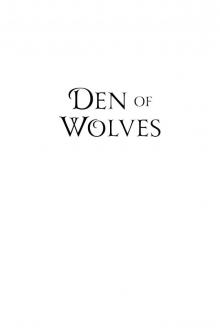 Den of Wolves
Den of Wolves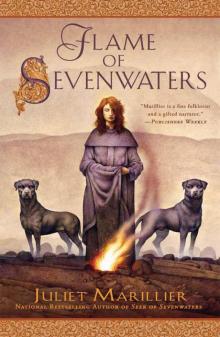 Flame of Sevenwaters
Flame of Sevenwaters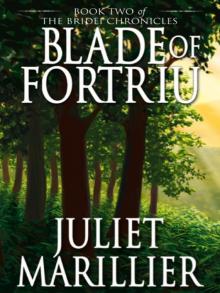 Blade of Fortriu
Blade of Fortriu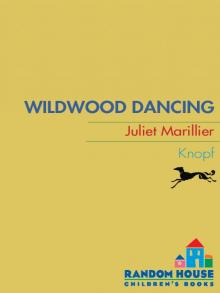 Wildwood Dancing
Wildwood Dancing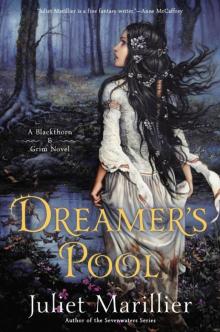 Dreamer's Pool
Dreamer's Pool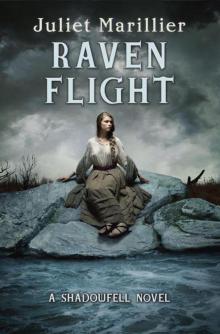 Raven Flight
Raven Flight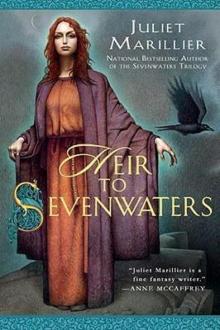 Heir to Sevenwaters
Heir to Sevenwaters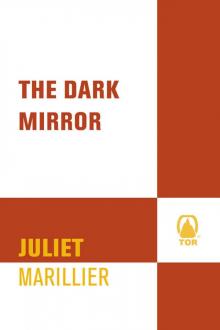 The Dark Mirror
The Dark Mirror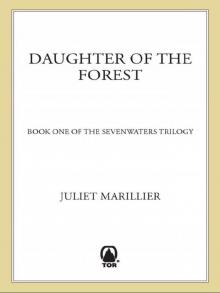 Daughter of the Forest
Daughter of the Forest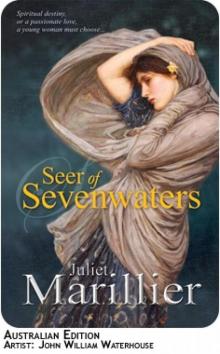 Seer of Sevenwaters
Seer of Sevenwaters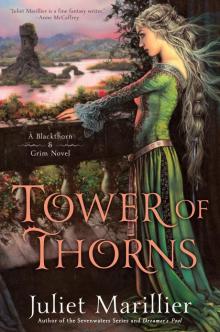 Tower of Thorns
Tower of Thorns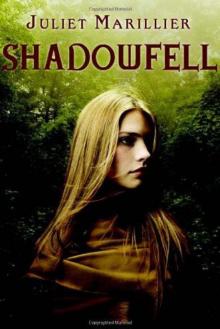 Shadowfell
Shadowfell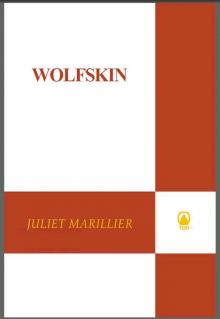 Wolfskin
Wolfskin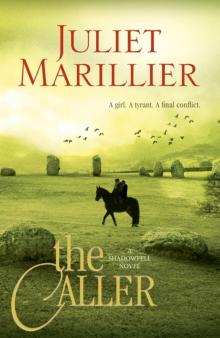 The Caller
The Caller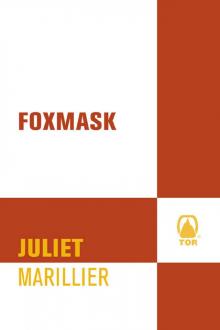 Foxmask
Foxmask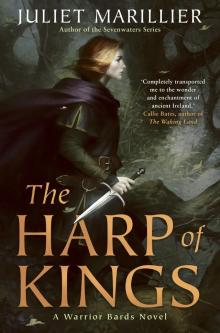 Harp of Kings
Harp of Kings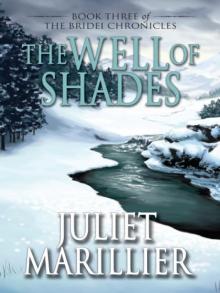 The Well of Shades
The Well of Shades Heart's Blood
Heart's Blood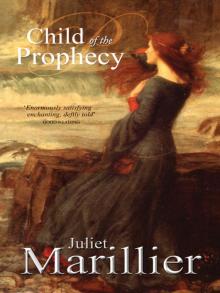 Child of the Prophecy
Child of the Prophecy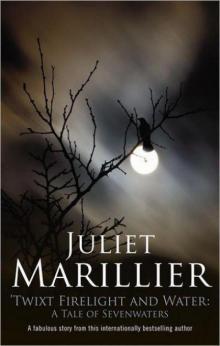 Twixt Firelight and Water
Twixt Firelight and Water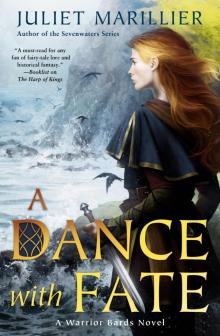 A Dance with Fate
A Dance with Fate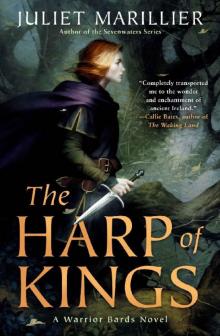 The Harp of Kings (Warrior Bards)
The Harp of Kings (Warrior Bards)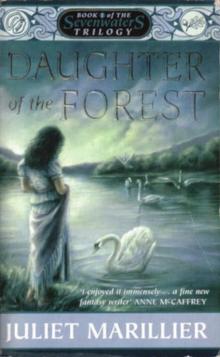 Daughter of the Forest (The Sevenwaters Trilogy)
Daughter of the Forest (The Sevenwaters Trilogy)![Sevenwaters [06] Flame of Sevenwaters Read online](http://i1.bookreadfree.com/i2/04/08/sevenwaters_06_flame_of_sevenwaters_preview.jpg) Sevenwaters [06] Flame of Sevenwaters
Sevenwaters [06] Flame of Sevenwaters![[Sevenwaters 04] Heir to Sevenwaters Read online](http://i1.bookreadfree.com/i2/04/12/sevenwaters_04_heir_to_sevenwaters_preview.jpg) [Sevenwaters 04] Heir to Sevenwaters
[Sevenwaters 04] Heir to Sevenwaters